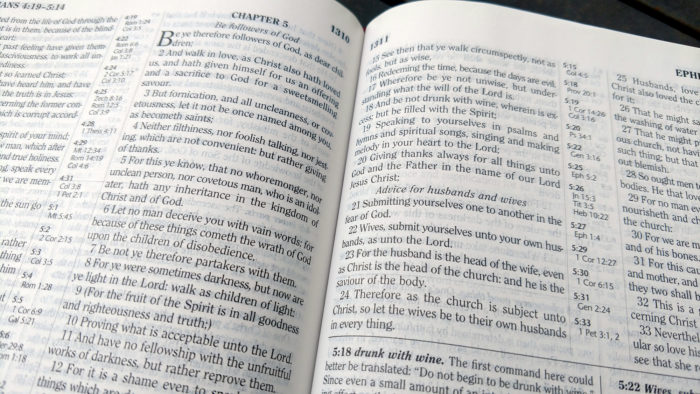Twelve Responses to Abuse Accusations in Christian Conferences, Part 3
How can Christians respond to patterns power and sex abuse, like those reported Sept. 12 by Publishers Weekly?
This series aims to answer some of those questions with responses to what went wrong before. In part 1 and part 2, I suggested we:
- Listen to abuse victims.
- Don’t respond with particular lines.
- Reconsider whether victims must “forgive” the accused.
- Don’t make judgments about salvation.
- Don’t treat a conference or Christian group like a church.
- Encourage all Christian leaders to act “above reproach.”
- Don’t reject all the accused person’s creative work.
- Don’t totally “shun” the person accused of abuse.
On a personal note, I have literally lost sleep over this issue. I’ve yelled a lot too.
But that’s nothing compared to what victims have gone through—even as they try to figure out how or whether they should share their concerns with someone else.
Here are the final four responses to abuse accusations in Christian conferences:
- Consider going back to “old ways” of ethical conduct.
- Don’t slander people who know, or defend, the accused abuser.
- Be shocked when accused men “repent” to everyone except God.
- Lament that these situations often come with no-win scenarios (for now).
9. Consider going back to ‘old ways’ of ethical conduct.
For this one, I’ll narrow my focus to one series of accusations in the article. This relates to what can only be described—quite generously—as a pattern of nasty, sexually charged “propositions,” often in a “joking” manner, that one person shared in various circumstances, both one-on-one to women and among a group.
Some women persuaded themselves they could just deal with this. But they could not, and by sharing with others, they believe they found a dangerous pattern.
Sinners gonna sin. No “rule” here, whether man-made or biblical, can stop them.
But it’s worth noting that the apostle Paul (him again!) specifically told us this:
… Sexual immorality and all impurity or covetousness must not even be named among you, as is proper among saints. Let there be no filthiness nor foolish talk nor crude joking, which are out of place, but instead let there be thanksgiving. For you may be sure of this, that everyone who is sexually immoral or impure, or who is covetous (that is, an idolater), has no inheritance in the kingdom of Christ and God.1

“Neither filthiness, nor foolish talking, nor jesting …” (Ephesians 5:4, KJV)
Christians, even if we aren’t abusive, we have gotten entirely too lax about this rule.
Yes, I will call it a rule. This isn’t “legalism.” What an insipid notion that would be. It says: “Let there be no filthiness nor foolish talk nor crude joking, which are out of place.” These are absolute terms. They hit me between the eyes, particularly the part about “crude joking.” Paul says that in no way does this fit “among you,” God’s people.
By the way, Paul does not say, “Instead, pray and fast and study the Bible.” He says, “instead let there be thanksgiving.” This is the best kind of party—a celebration, not of evils that “must not even be named among you,” but of our God-given gifts.
Sure, we can debate about whether this kind of “crude joking” belongs in our fiction. Or we might quibble what “must not even be named” means (after all, Scripture itself “names” sexual immorality and other sins). But don’t miss the point. Paul is saying: Don’t. Even. Go. There. It’s not about “legalism.” It’s about holiness.
It’s time we got back to that standard, to please God, “legalism” claims be damned.
And as one reader speculated about such a speech guideline among Christians: “It won’t prevent [abuse], but [the rule] does expose [abuse]. Because if we all draw lines earlier, it becomes more evident who is NOT drawing lines.”
Also, literary agent Steve Laube (who also oversees Enclave Publishing) wrote this:
Earlier this year I helped a conference director craft a “Conference Code of Conduct” and have adapted it as a statement for our agency:
Every person involved in our agency is expected to act in a manner that reflects biblical values and to act in a manner that pleases God. We are expected to be respectful and treat everyone the same – regardless of rank, gender, or socioeconomic position. Christian men and women are expected to maintain the highest moral standards as a reflection of God’s holiness. While much of today’s culture has abandoned these precepts, the biblical principles for behavior are essential. Our actions and words are a testimony of who we are as Christ followers.
(Ps. 51:9–10, Phil. 4:8, Ps. 41:12, 1 Cor. 6:19–20, Ps. 24:3–5, Gal 1:10)
This is not a debate. There should not be a question about how we behave as followers of Christ. Our words and behavior are indeed a testimony to Him whose name we proclaim. … In our weakness, we must rely on Christ who gives us strength (2 Corinthians 12:9). That is why we are urged toward sanctification (Romans 6:19), to the “holy calling” (2 Timothy 1:9), and to “walk worthy” (Ephesians 4:1).2
10. Don’t slander people who know, or defend, the accused abuser.
Briefly here: the Holy Spirit is ridiculously patient. And some decent Christians are ridiculously naïve and sheltered about what abuse is, how it works, and how they ought to respond when someone says so-and-so has a pattern of power-abuse.
We must be patient with these people until such time as they may finally get it.
What we can’t do is get angry, or yell at them over social media, or (this happens most often on Twitter, no doubt) say that they’re guilty of the exact same sins as the original abuser. That’s not true and not helpful to teach that person. And on a practical level, it doesn’t work. It only feeds the persistent myths that a victim who accuses someone is only doing this for attention, or herself is guilty of leading him on, or any of that nonsense.3
Unless you yourself are a victim, still struggling with the harm and in need of protection, engage with this naïve defender of an abuser. Love that enemy. Dump some verbal coals on his head, Romans 12–style. Don’t confuse the defender’s bumbling naivete with the actual abuse done by a twisted perpetrator.
11. Be shocked when accused men publicly ‘repent’ to everyone except to God.
If you retain nothing from this article, remember this part.
In many cases, when high-profile Christians are reputably accused of abusing their power, they tend to minimize their offense. They talk about how they’ve hurt their own family, or their church. They may say this was a one-off sin (when other victims may beg to differ). In many cases, they only emphasize the human harm.
But they don’t speak anything like David’s repentance at his own sexual sin born of power-abuse: “Against you [God], you only, have I sinned / and done what is evil in your sight …”4
No expression of repentance before God.
No mention of Jesus or the gospel or the fact that any sin, no matter how terrible it is to human victims, is foremost a sin against God almighty.
No mention of God or their own professed Christian faith.
That really bothers me.
It bothers me almost as much that it took me so long to see the missing piece.
Without such expression, these statements of regret have nothing to do with Christ. Frankly, they sound little different from lip-biting apologies formed mainly to CYA and make the lawyers happy. They sound like PR 101, not Gospel Confession 101. PR 101 says “repent” for the bare minimum only as people find out. The gospel says to repent for everything on exactly the scale as the offense is known or damaging.
Christian leaders, if/when we do sin, we must show that we repent first to God.
As my Speculative Faith colleague Rebecca LuElla Miller wrote:
Repentance is more than saying sorry. I think there should be some awareness expressed that these sins are against God and have hurt His name, that they are betrayals of those to whom they should have been faithful (family and friends–aren’t there wives and even children of these men who are being affected by their sinful behavior?) I think an admission that these sins are not some small thing, that they aren’t wrong merely because they were caught, that they aren’t wrong merely because the consequences are grave, but rather they are wrong because they are an offense, first, against a pure and holy God–seems to me that’s most like David crying out to God in Psalm 51.
12. Lament that these situations often come with no-win scenarios (for now).
In pondering these accusations, praying for victims and friends, and planning how or whether I ought to even say anything, I have felt much like Dr. Stephen Strange.
That’s because I can’t help trying to plan out alternate scenarios to defeat this evil. What about this verse? That verse? How is a church like/unlike a conference? Is there any way we can identify potential power-abusers (who themselves might have witnessed or been subject to power abuse) and put them through discipleship first? What did the local church do? Not do? How can we do better? How can we plan, train, or program to get the level of power-abuse down to zero percent? How could we possibly avoid the threat of digital “mob rule” or false accusations?
In Avengers: Infinity War, our heroes are desperate to save the universe from the mad genocidal titan Thanos. Dr. Strange magically gazes forward in time to view alternate futures. What if our heroes did this? Or that? Or this? Strange witnesses 14,000,605 possible futures. But they achieve victory over Thanos—in only one.
Despite all we do, we’re facing a no-win scenario. We can’t out-moralize, out-think, or even out-disciple our way into a Church, much less a world, in which Christian leaders won’t be abusing their power to harass, assault, or even try to rape victims.
There’s only one way—one possible future to put an end to mad maniacs for good.
That’s the return of Jesus. When he returns, to wrap up this era and redeem his creation, he’ll put all things right. Everything sad will come untrue. All our “light and momentary afflictions” (2 Cor. 4:17) will be only the cover and the title page, as the story advances and finally, at last, we will enter the never-ending adventure.
Yes, saying this in the middle of grief and abuse may sound tacky. Again, it’s like reminding the grieving parent that she’ll see her child again at the resurrection when she’s still weeping against the red and blue flashes of ambulance lights.
That’s why we don’t say this truth there. We say it here. We proclaim it, explore it, and celebrate it, in our articles, in our casual comments to each other, in our church teaching and sermons and friendships, in our writers’ conferences and publications and books. And we explore and celebrate this truth in our fantastic stories.
- Ephesians 5: 3–5. ↩
- Steve Laube, “Integrity In All Things,” Sept. 24, 2018, SteveLaube.com. ↩
- Another myth is that the accuser may only want media notoriety. This myth presumes the accuser is only affected by a single cultural space, “the media,” which supposedly only rewards #MeToo whistle-blowers. (This is not always true, especially when many #MeToo accusations go against powerful media figures.) This myth also presumes the expiration or irrelevance of sheltered religious environments, where people who accuse a popular leader or religious figure will only face more harassment or blame. For example, see Rachel Denhollander’s tweet thread about her experience. ↩
- Psalm 51:4. ↩









































Stephen, good post. I found your point 11 especially enlightening.
I of two minds about #10. Is it slanderous to name their harmful behavior if they’re victim-blaming or otherwise perpetrating sexist crap? I don’t find that most defenders of an abuser are THAT naive, say, if they’re above 30. More often than not it smells something more like willful ignorance.
(Like peeps assuming that the first time they hear of an accusation, that there hasn’t been due diligence done when the legwork had probably been started months ago. [Yes, I am calling you out])
Organizations like Publishers’ Weekly HAVE to be extremely careful in accusing people of crimes like this. I always assume that posts have been carefully weighed against evidence.
Brennan, I don’t assume that and you shouldn’t either. PW did not in fact accuse anyone of committing abuse–what they did was report that conferences have reacted to allegations of abuse. Reporting that reaction takes a minimum verification of a lot less than you apparently think.
Though in fact, PW did MORE than that minimum, as I mentioned in my comment above. But, I don’t think it’s safe to assume something is correct because it’s been reported nationally. Not every reporting organization does the same level of due diligence–I would say it’s better to maintain at least a little skepticism.
Again, Travis, you miss the point.
Well, as the primary person who questioned how much information was actually available, note I was concerned about people assuming “because it’s in the press, it’s true” because I know many reported events are false. I was also concerned with what I saw as a jumping-on-the-bandwagon-syndrome, following a crowd to a conclusion without hard evidence, which lots of decent, well-meaning people do without even thinking about.
The Publisher’s Weekly article was pretty bare bones and reported names of people conferences had disbarred under accusations and little more. I insisted at the time that such reporting proves that something (bad) happened, but does not prove what happened, (specifically abuse)–though I also said at the time that PW may have in fact done more investigation, but no one knowledgeably said that they did at the time (even after I repeatedly asked things like, “If you have more information, please share” and “If you know more, please mention it,” for which I got no reply at first).
Eventually, the person who wrote the article posted here on Speculative Faith (on the post for Part 2 of this series if I remember right) that indeed, more investigation was done than the minimum and that at least two sources were involved in the reporting of each person. Underneath that reporter’s post, I publicly retracted my skepticism about the PW article. Which I’m now repeating.
If what I just said wasn’t clear enough, I’m saying I was wrong about the nature of the PW article–though note, I was never dogmatic about my opinion; I was continually asking for more information. Now I’ve received it and it’s clear I was mistaken.
I have no regrets for questioning it, though. Some people had more info than me, but some did NOT and believed the exact same things anyway, largely because it had been reported by PW. I know that many people feel confident something must be true because a number of people they trust believe it, but I don’t think like that and I never have. And I’m not sorry about it–I think it’s just and right for me to want more information before I follow along with ideas assumed to be true without real evidence.
This has been an excellent series- and I agree spot on with a majority of the things you’ve spoken about. Like Travis I find point 11 to be particularly telling. This is what bothers me most, and to often we see people apologize to those that they offended, but never really pour out their heart about their sin they have come face to face with. Most of it is pride- of course, and humility is a tough thing at times… Again great post
Yeah, it’s telling. Though I remember a televangelist (Jimmy Swaggart, in 1988) doing what appeared to be a really full confession of bad behavior (he was hiring prostitutes), including acknowledging culpability before God including voluntarily stepping down from his ministry. But it wasn’t long before he was preaching again…and accused of hiring other prostitutes…a very sad situation really.
I told that story to illustrate that even a full confession doesn’t really guarantee the problem is over.
I hope the reverse can be true–that someone could be really dealing with problems, even though their confession was pretty weak. (But I kinda doubt it.)
If a man is accused of assault, the public needs to assume that accusation is true until proven otherwise. By that, I mean that we need to take reasonable precautions, such as: if a person (male or female–females also commit assault, like in the case of Lecrae’s childhood abuser) is accused of molesting a child, don’t let them conduct children’s church. I’m so sick of this junk happening, and have seen it time and again. That’s why I’m a hawk when people are spending time with my daughter. Because this crap happens ALL the time. STOP trying to justify potential abusers. How often are people wrongly accused of abuse? Not often. How often are abusers never ratted on? Extremely often. What’s the likelihood a potential abuser is an actual abuser? Pretty dang high. Let’s not be naïve, friends.
Stephen, I always appreciate your loving responses to difficult situations. Yes, we need to not slander people. We need to conduct ourselves with honor, even when calling out heinous crimes. And we need to watch ourselves, lest we ourselves fall into some other type of sin (like pride-filled rage) while railing against their extremely damaging sin. We must focus on our own holiness, and on walking in intimacy with Christ, and that gives us way better radar for when things are “off.”
Brennan–yes and no. I agree in taking immediate precautions if even one solid report of sexual abuse comes up about a man (or woman). But that “taking immediate precaution” is not the same as being certain of guilt. Certainty requires more information.
Where did I say “certain of guilt”? You’re missing the point.
Stephen, I like your point 10 and needed to re-read it today. Yesterday I found the “confession” of one of those named in the PW article. I’d already read something about that post—that he only put it up when he’d been contacted by the PW reporter and realized that his misconduct would go public. A 100 or so commenters went on record praising him for his transparency and his bravery. And I wanted to puke. The same had happened at a forum when another of the four made public what had happened. But the fact is, these people were reacting before they had the whole story. They didn’t know. Some of them were reacting from their own experience which had been positive and uncompromising. So they aren’t “enabling” this behavior. They simply are unable to speak to it because it’s outside their experience and they like the guy they were responding to. So, no, they should not be vilified or condemned. And it’s good to remember that.
Becky